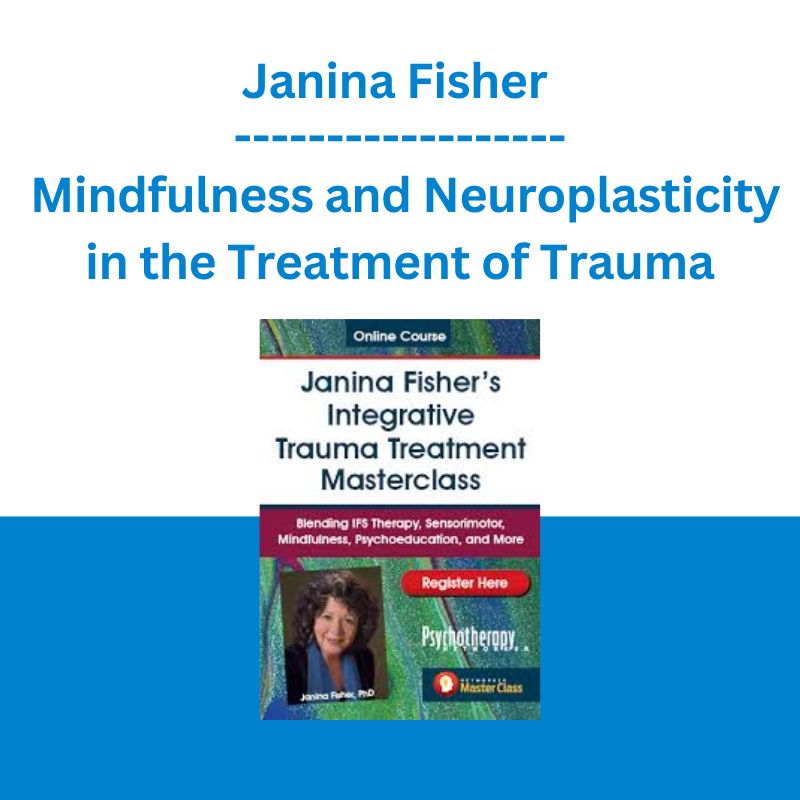*** Proof of Product ***
Exploring the Essential Features of “Janina Fisher – Mindfulness and Neuroplasticity in the Treatment of Trauma”
Traumatic experiences are remembered not just in words but as speechless terror, overwhelming emotions and body sensations, self-destructive impulses and intractable depressions.
What were once discrete traumatic events have been “wired” into the brain and body as automatic reactions to present experience disconnected from any context that could explain them. Despite the best efforts of the client and therapist, the world still feels unsafe decades after the trauma.
Join international trauma expert, author, and presenter Janina Fisher, PhD, and learn techniques drawn from Sensorimotor Psychotherapy, a body-centered therapy for the treatment of trauma. Dr. Fisher artfully weaves lecture, demonstration video and experiential exercises to provide you with new strategies to treat the often baffling treatment challenges presented by these traumatized clients.
Easily integrated into traditional psychotherapy models, this way of working enables both you and your client to feel a greater sense of hope and mastery as you address the challenges of trauma treatment.
Speaker
Janina Fisher, PhDRelated seminars and products
Janina Fisher, PhD, is a licensed clinical psychologist and former instructor at The Trauma Center, a research and treatment center founded by Bessel van der Kolk. Known as an expert on the treatment of trauma, Dr. Fisher has also been treating individuals, couples and families since 1980.
She is past president of the New England Society for the Treatment of Trauma and Dissociation, an EMDR International Association Credit Provider, Assistant Educational Director of the Sensorimotor Psychotherapy Institute, and a former Instructor, Harvard Medical School. Dr. Fisher lectures and teaches nationally and internationally on topics related to the integration of the neurobiological research and newer trauma treatment paradigms into traditional therapeutic modalities.
She is co-author with Pat Ogden of Sensorimotor Psychotherapy: Interventions for Attachment and Trauma (2015) and author of Healing the Fragmented Selves of Trauma Survivors: Overcoming Internal Self-Alienation (2017) and the forthcoming book, Working with the Neurobiological Legacy of Trauma (in press).
Speaker Disclosures:
Financial: Dr. Janina Fisher is a consultant for Khiron House Clinics and the Massachusetts Department of MH Restraint and Seclusion Initiative.
Non-financial: Dr. Janina Fisher is on the advisory board for the Trauma Research Foundation and is a patron for The Bowlby Centre.
Target Audience
Addiction Counselors, Case Managers, Counselors, Marriage & Family Therapists, Nurses, Psychologists, Social Workers, and other Mental Health Professionals
Objectives
- Describe the neurobiological effects of traumatic experiences.
- Identify indicators of post-traumatic implicit versus explicit memory.
- Explain the role of the body in perpetuating post-traumatic symptoms.
- Describe neuroplasticity and how it can be facilitated in treatment.
- Demonstrate mindful versus non-mindful therapeutic interventions.
- Discuss the role of repetition in neuroplastic change.
Outline
HOW TRAUMATIC EXPERIENCES ARE REMEMBERED
- Results of the brain scan research
- Narrative memory centers are inhibited
- Activated implicit memory: Intense emotions, body sensations, impulses, intrusive images
IMPLICIT AND PROCEDURAL MEMORY SYSTEMS
- How do we know we are remembering without a story?
- State-specific memory and traumatic triggers
- Neuroplasticity and survival under threat
AUTONOMIC NERVOUS SYSTEM AND ADAPTATION TO TRAUMA
- “Neurons that fire together wire together”
- Trauma symptoms: Kindling and sensitization
- “Stuck’ cases
- Treatment-resistant depression
- Shame and self-loathing, numbing and shutdown
- Clients who go from crisis to crisis
MINDFULNESS-BASED TREATMENTS
- The symptoms tell the story better than the story
- Introduction to Sensorimotor
- Psychotherapy
- Video: Working with the body in treatment
MINDFULNESS IN CLINICAL PRACTICE
- Ingredients of mindfulness
- Avoid attachment or aversion
- Implicit and procedural memory
REGULATING TRAUMA-RELATED EMOTIONS, REACTIVITY AND AUTONOMIC AROUSAL
- Cognitive resources
- Somatic resources
- Interpersonal neurobiological resources
PRINCIPLES OF NEUROPLASTIC CHANGE
- Inhibit problematic pattern of response
- Mindfully notice rather than react
- Experiment with new action or reaction
- Practice new pattern until it becomes automatic
NEUROPLASTIC PRINCIPLES TO TALK THERAPY
- Practice, practice, practice!
- Notice, notice, notice the results
- Encode change as it occurs
Please see the full list of alternative group-buy courses available here: https://lunacourse.com/shop/










 Matan Feldman - The 13-Week Cash Flow Modeling - Wall Street Prep
Matan Feldman - The 13-Week Cash Flow Modeling - Wall Street Prep